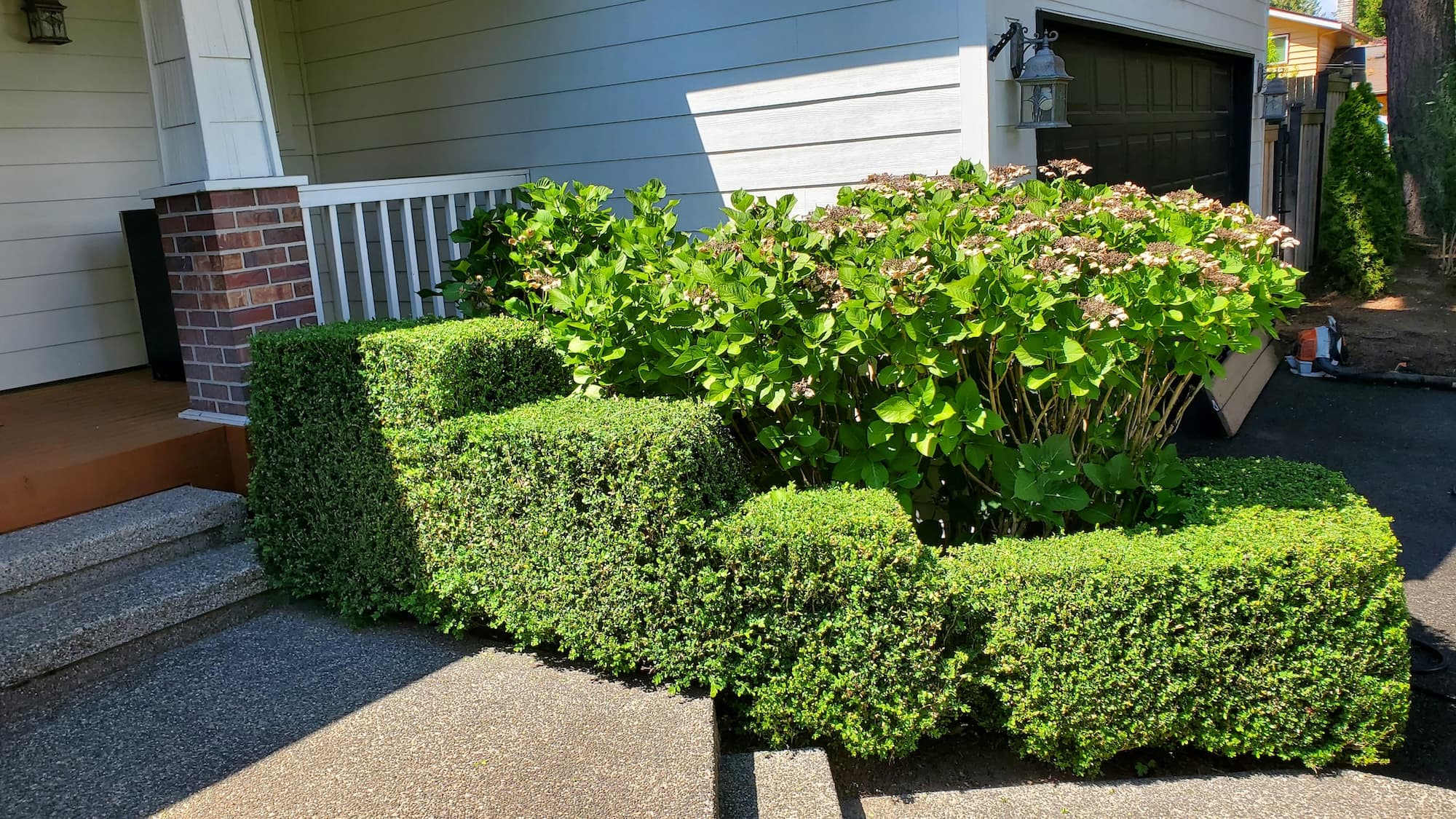West Seattle Trim shrubs from traffic signs
Homeowner’s Issue
West Seattle properties face a specific set of problems that make shrub overgrowth common and signage visibility a safety issue. Our winters dump frequent, concentrated rain on compacted, glacially derived soils that hold water in low spots; combined with shaded north-facing slopes and mature street trees, that creates prime conditions for moss, ivy and rapid lateral shrub growth. South- and west-facing yards around Admiral and Alki burn off moisture faster and can hide fast-growing hedges behind drier soil, so visibility gaps appear unevenly across the neighborhood. Steeper streets and sightline-critical corners — especially near Lincoln Park and the Delridge/Admiral corridors — get obstructed quickly by unchecked rhododendrons, laurels and cotoneaster.
HOA rules and Seattle sight-triangle laws expect clear lines for crosswalks and curbside signs; left untrimmed, shrubs invite complaints, tickets, and real safety risks to pedestrians and drivers. Homeowners also face salt and wind exposure near the waterfront that stresses plants and hides deadwood inside dense foliage. Our approach focuses on sustainable pruning and debris removal, improving drainage where needed, and setting up low-maintenance regimens that respect nesting seasons and local watering limits. We do not use herbicides — just clean cuts, organic soil practices, and smart mulching to keep signs visible and plants healthy.
Our Quality Service
- Site assessment to identify visibility issues, growth patterns, and drainage problems.
- Targeted pruning: clean structural cuts, crown reduction where necessary, and selective thinning to open sightlines.
- Tools: hand pruners, loppers, pole pruners, battery hedge trimmers, and chipper for large clippings.
- Timelines: small curbside jobs done same-day (1–3 hours); medium yards over half-day; larger properties scheduled within 3–7 days.
- Local practices: we time major pruning for late winter/early spring when plants are dormant and avoid heavy cuts during bird-nesting season (April–July).
- Sustainability: organic compost, mulch, and no herbicides; we favor mechanical and cultural controls and native-friendly plant adjustments.
- Water rules: we advise summer watering windows and low-flow strategies to comply with regional conservation guidance.
Benefits: improved safety, cleaner curb appeal, reduced maintenance, and healthier plants that cope better with West Seattle’s rain, shade, and wind.
What’s Included
- Pre-work assessment and visibility check against sight-triangle norms.
- Pruning and shaping to clear signs and pedestrian sightlines.
- Removal of branches and chippings; choose haul-away or green‑bin/compost drop-off.
- Final tidy: bed edging and light weeding around shrub bases.
Options / Upgrades: - Mulch + landscape fabric (for high-weed beds).
- Organic soil amendment (compost/top-dress).
- Root collar/excavation for invasive ivy or heavy-moss removal.
- Stump grinding or selective removal (quoted separately).
- Seasonal maintenance plan (quarterly, bi-monthly, monthly).
Before & After / Expectations
- Noise & mess: expect saw and chipper noise for larger jobs and bark/wood chips on site until collected.
- Access: need a clear 3–4 ft access path from street or driveway; tight alleys may add time.
- Debris handling: standard jobs include haul-away; large volumes incur a green-waste fee (quoted up front).
- Timelines: same-day for small trims, 1–3 business days for most curbside jobs, larger projects scheduled within a week.
Care tips for West Seattle: - Water early morning in summer; avoid evening watering to reduce moss.
- Expect weed pressure in late winter/early spring; mulch now to suppress it.
- Moss and ivy thrive in shaded corners — improve drainage and thin canopy to reduce moss.
- Light touch-ups in summer keep sightlines clear between major prunes.
FAQs
Q: How soon can you clear a sign near my property?
A: For most curbside jobs we can do an initial visit within 1–3 business days and complete simple trims same-day.
Q: Do you use herbicides to prevent regrowth?
A: No. We use mechanical removal, organic mulches, and soil improvement only — no herbicides.
Q: Will you prune during nesting season?
A: We avoid major structural pruning April–July when possible. Small safety trims can be scheduled with a site check to avoid active nests.
Q: Do you handle disposal?
A: Yes — haul-away is included on typical jobs. For large volumes we offer green-waste drop-off or customer-directed composting.
Q: What if the shrub is on a slope or near a sight triangle?
A: We assess slope stability and may recommend staged pruning, erosion control, or soil amendment to protect the bank and preserve sightlines.
Call to Action
If a hedge, laurels, or roadside shrub is hiding a sign near your West Seattle home, we’ll make it readable and sustainable. Quick scheduling, free photo estimates, and local experience around Alki, Admiral, and Lincoln Park. Email to book or get a fast quote:










